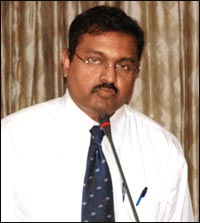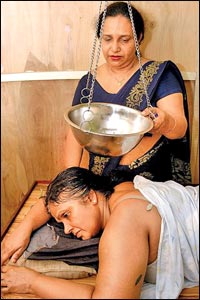|
Health Watch
Non-Communicable Diseases - healthy workplace key to prevention
Suharshi Perera
Maintaining healthy activity levels
Promote a minimum of 30 minutes continuous brisk physical activity a
day
-Brisk walking from bus stop to work place
-Walking around the workplace after a meal
-cycling to work
- Taking the stairs instead of the lift
Employers to arrange sport facilities within the work place Volley
ball/ badminton courts/ tennis courts Gymnasium
Facilities for mental sports ( carom, chess, sudoku)
Maintaining activity record book
-Employers can assist by providing a printing record book where the
type of activity and the time spent can be recorded.
Courtesy: The Health Ministry, ILO
Chronic NCDs Percentage
Cardiovascular diseases 34
(Including hypertension, strokes)
Respiratory diseases 11
Cancer 15
Diabetes 4
Other NCDs 14
Global warming, economic recession, and for Sri Lanka it will be
either dengue or resettling IDPs. Non-communicable diseases (NCDs) is
another challenge that needs immediate attention as Sri Lanka is
experiencing a slow epidemic of non-infectious diseases, health
authorities warn.
|

Dr. Palitha Karunapema. Picture by Sudath Nishantha |
"Most premature deaths in Sri Lanka occur due to non-communicable
diseases and unfortunately many die of heart diseases and strokes which
are largely preventable", Healthcare and Nutrition Ministry Secretary
Dr. Athula Kahadaliyanage says.
Promoting and protecting health in workplace can largely contribute
to prevent non- communicable diseases especially the cardiovascular
diseases. Such initiatives can achieve many benefits including an
increased productivity, reducing absenteeism, improved working capacity,
high morale of the staff and also can reduce the expenses spent on
medical insurance, he said.
He was speaking at a workshop organized by the International Labour
Organization, WHO and the Ministries of Healthcare and Nutrition, Labour
Relations and Manpower and Public Administration and Home Affairs in
Colombo Friday to mark World Heart Day which fell yesterday. This year's
theme was 'work with heart' which focused on preventing heart diseases
by creating a healthy environment at workplace.
What are NCDs?
Non-communicable diseases (NCDs) include cardiovascular diseases
affecting heart and brain, diabetes, chronic respiratory diseases,
cancer and other (like kidney diseases).
Why should NCDs be prevented?
According to health reports 58 million deaths occur annually across
the globe. Of that about 30 million are due to chronic diseases and 50
percent of that, are deaths due to ischemic heart diseases.
In Sri Lanka too the leading cause of death is ischemic heart
diseases. The above non-communicable diseases account for 75 percent
deaths in Sri Lanka.
About 600 deaths are reported in Sri Lanka a day of which 400 are
deaths due to non-communicable diseases. The percentage of deaths due to
some of the non-communicable diseases is given below:
There is huge underreporting of diabetes cases and diabetes is an
underlying cause or cardiovascular diseases, Consultant Community
Physician of the Health Ministry's Non-communicable Diseases Unit Dr.
Palitha Karunapema said.
Apart from deaths a considerable number of cases of disability also
occur due to NCDs. The Government spends a colossal amount on treating
NCD affected patients and it spent Rs. 600 million to treat
cardiovascular diseases in 2005, he said. By investing on prevention the
country can save a huge amount of money spent on treatment.
|

Certain symptoms are sometimes not visible from the outside |
The economic cost of the NCDs results in due to loss of productivity.
The social cost is reduction of quality of life, disruption of family
life and the cost of healthcare could be an enormous burden to the
family. Therefore serious attention should be paid to prevent heart and
other non-communicable diseases to minimize the healthcare cost,
economic cost and social cost by investing more on prevention.
Identifying the risk factors of non-communicable diseases is also vital
in prevention, Dr. Karunapema said.
Risk factors
The common risk factors and non-communicable diseases are unhealthy
diet, tobacco and alcohol consumption and lack of physical activity.
Prevalence of unhealthy diet is a main cause of NCDs, the Consultant
said. Around 80 percent of the population in Sri Lanka does not consume
a healthy diet. A person needs to include five portions of vegetables
and fruits in his/her daily diet.
Avoid consuming alcohol and smoking is also helpful to keep diseases
at bay.
Physical activity is far higher among Sri Lankans compared to the
West due to cultural reasons. However, regular working out and
exercising is more prevalent in the West. It is important to note that
the deaths due to cardiovascular diseases have reduced over the past 30
years in rich countries where as there is a considerable rise in Sri
Lanka, he noted.
Misconceptions
|

Stress leads to NCDs |
A popular misconception about non-communicable diseases is older
people die of these diseases. According to reports half of the people
dying of chronic NCDs are less than 70 years. Mortality rate due to
non-communicable diseases are higher in Sri Lanka and some Asian
countries than the Western countries. Countries like Sri Lanka and
India report a relatively high number of premature deaths due to NCDs,
he said.
How to prevent?
Addressing the risk factors and acting accordingly may help in
preventing NCDs in Sri Lanka. That is why promoting and protecting
health at workplace is important. Many of us spend most of our time in
workplace during the day. Therefore health and safety at work place
largely contribute to combat diseases.
Creating awareness among employers and employees also helps
preventing the diseases. Implementing cost-effective NCD screening
programs is another way to prevent NCDs.
This includes integrated risk screening. By diagnosing the diseases
early, damage and treatment costs can be minimized by controlling the
disease at early stages.
A problem commonly prevalent in Sri Lanka is even after being
screened and at risk, people do not change their lifestyle and behaviour
to prevent the disease, the consultant said.
Healthy diet and nutrition promotion in workplace
Availability of healthy diet in canteens and maintaining standards on
safe and healthy food. Such canteens can be designated as 'healthy
canteens'. Nutrition and food safety promoting environment for staff.
Access to information on good nutrition and food safety.
The diet
It should be a broad classification of food based on permissible
levels. Should be readily available as part of regular diet. E.g.:
Yellow and green vegetables, green leaves of many varieties, fruits,
yams and tubers. Within limits E.g.: Red meat once a week, limiting salt
(total 5g a person), sweets (one tsp sugar per cup of coffee/tea), fat
(total 5g a person to be used in a work setting 20ml/person/day) Not
recommended E.g.: addition of monosodium glutamate to food, consumption
of frizzy drinks, fast foods and snacks.
The four food groups that should be included in all menus Cereals
especially red rice, rice flour, yams and tubers Fats and oils
preferably polyunsaturated fats such as soya oil, corn oil and sunflower
oil.
Legumes and animal protein such as fish, chicken and eggs (red meat
with limitations)
Fruits, vegetables and greens When preparing menus consider target
groups. If the workplace has staff doing more physical work, the weight
of food in total per person should be higher compared to desk workers
(guidelines should be given by the Health Ministry)
-Menu plan should be displayed together with nutritive value and cost
- Food preparation areas should be seen, clean surfaces should be
maintained.
A schedule for cleaning utensils should be maintained, cross
contamination should be avoided, ingredients should be of good quality
and stored properly, food should be cleaned thoroughly, cooked and
processed optimally and cooked food stored properly and served cleanly.
- Food handlers must be clean, with correct protective gear worn and
undergo regular health check-ups
-There should be regular contact between the Canteen Manager, Public
Health Inspectors and workplace management.
-Labels and expiry dates of food should be well noted during
procurement and storage.
Promoting nutrition and healthy environment
-Promoting healthy snacks during workshops and meetings(E.g.: fruits,
fresh milk)
-conducting awareness programs
Courtesy: The Health Ministry, ILO
Singapore Cardiologist commends
Medical Crossword Feature
Edward Arambewala
A leading Cardiothoracic Surgeon from the Mount Elizabeth Medical
Centre, Singapore Dr. Saw Huat Seong on Thursday commended the Daily
News Medical Page for introducing the crossword feature for health
education which appears to be the first time that this has been done in
a newspaper in this region.
Dr. Seong was in Colombo as a special invitee at the annual sessions
of the College of Physicians, Sri Lanka held at the Ceylon
Intercontinental. Dr. Seong was meeting the press to talk on preventive
health to control and combat heart disease and reduce the incidence of
heart operations when he refered to the Medical Crossword. Dr. Seong
also drew a consolation prize winner in Medical Crossword No. 38. The
winner he picked was Thamali Kariyawasam 22 yrs. of No. 289/3, Temple
Road, Dalugama, Kelaniya an undergraduate of the Kelaniya University.
Parkway Health Office in Colombo will offer the prize to Thamali at
the official prize draw of Crossword No. 39 to be held early October.
Spanish Government approves controversial abortion reforms
Spain's Socialist government Saturday approved controversial reforms
to the country's abortion law which would allow women as young as 16 to
undergo the procedure without parental consent.
The proposal was passed at a cabinet meeting despite strong
opposition from the Roman Catholic Church, the conservative opposition
Popular Party and even many supporters of Prime Minister Jose Luis
Rodriguez Zapatero's Socialist Party.
The measure now will to go to parliament for approval, Deputy Prime
Minister Maria Teresa Fernandez de la Vega told a news conference.
Under the proposed reforms, abortions would be allowed for women of
16 and over on demand up to the 14th week of pregnancy, and up to 22
weeks if there is a risk to the mother's health or if the foetus is
deformed.
Women can also undergo the procedure after 22 weeks if the foetus has
a serious or incurable illness.
"We want to offer minors as much protection as possible and the most
respect for their basic rights," said de la Vega.
MADRID, AFP
Chlorine in swimming pools linked to allergy risks
Swimming in a chlorinated pool may boost the odds that a child
susceptible to asthma and allergies will develop these problems, a study
released on Monday indicates.
"These new data clearly show that by irritating the airways of
swimmers, chlorination products in water and air of swimming pools exert
a strong additive effect on the development of asthma and respiratory
allergies such as hay fever and allergic rhinitis, Dr.Alfred Bernard, a
toxicologist at the Catholic University of Louvain in Brussels, said in
an email.
"The impact of these chemicals on the respiratory health of children
and adolescents appears to be much more important at least by a factor
of five than that associated with secondhand smoke, "Bernard noted.
Taken together with his team's prior studies, he added, "There is
little doubt that pool chlorine is an important factor implicated in the
epidemic of allergic diseases affecting the westernized world."
In the current study, Bernard and colleagues compared the health of
733 adolescents, 13 to 18 years old, who swam in chlorinated outdoor and
indoor pools for various amounts of time with that of 114 "control"
adolescents who swam mostly in pools sanitized with a concentration of
copper and silver.
In children with allergic sensitivities, swimming in chlorinated
pools significantly increased the likelihood of asthma and respiratory
allergies, the researchers report in the journal Pediatrics.
Among "sensitive" adolescents, the odds for hay fever were between
3.3- and 6.6 - fold higher in those who swam in chlorinated pools for
greater than 100 hours and the odds of allergic rhinitis were increased
2.2- to 3.5 - fold among those who logged more than 1,000 hours of
chlorinated pool time.
For example, among children and teens who swam in chlorinated pools
for 100-500 lifetime hours, 22 children out of 369(6.0percent) had
current asthma, compared with those who had spent less than 100 hours (2
of 144,1.8 percent). The proportions with asthma rose with longer
exposure, to 14 out of 221 (6.4percent) who had been swimming for 500-
1,000 hours, and 17 out of 143 (11.9percent) who swam for more than
1,000 hours. The risk of asthma and allergy was not influenced by
swimming in copper- silver sanitized pools and children without allergic
tendencies were not at increased risk of developing allergies.
Megan Brooks, Reuters
Practising MUALSV
Patients are generally reluctant to give publicity to their ailments
and even to successful treatment to their medical or surgical matters.
"But, I have decided to give publicity to my bitter experiences I had
to face for four years in England, for the benefit of many patients who
are tortured unnecessarily as a result of delayed diagnosis, prolonged
ineffective treatment using drugs, and exposure to unnecessary expensive
and dangerous modern investigations.
The MRI scans of the vertebral column which are justifiable only
before surgery for cases of back-pain and sciatica, pain in the leg and
the buttocks, arising from pressure on the sciatic nerve by a pressure
caused by prolapsed disc."
Purvana Katheeswaran, who lived in London for a considerable period
of time and returned to Sri Lanka to seek remedy for her prolonged
illness which was almost killing her, said.
|

Ayurveda treatment |
Purvana, from Batticaloa went to UK in July 2004 to get married to a
citizen of UK. She said that she developed a pain on her neck and while
in UK the pain spread to her left arm and the fingers swelled.
Doctors in UK attributed the neck pain to my occupation in Sri Lanka
as a computer operator and the swellings on my fingers to arthritis.
Although four MRI scans on the neck bones were done, no abnormality was
detected. All treatments were ineffective and I suffered severe pain. My
movements were restricted when I developed pain in my left shoulder as
well. My worst suffering began with the intolerable pain, numbness and
muscle cramps spread to my right thigh, calf and my right toes and the
soles of the feet. I sought the assistance of nearly fifteen doctors,"
she said.
Puvana told the Daily News that, "Specialists treated me with heavy
doses of drugs, and a tolerable back ache became intolerable. Unbearable
pain and suffering, both physical and mental, forced me and my husband
to return to Sri Lanka for confirmation of diagnosis treatment.
We wanted to go to Apollo Hospital, Colombo. But I wished to see my
friends and relatives in Batticaloa before getting admitted to the
hospital in Colombo.
"It was in Batticaloa, that my husband heard of the successful
treatment of sciatica and severe pains without surgery through a
procedure called 'Manipulation of the Lumbo-Sacral Vertibrae under
anaesthesia or (MUA-LSV) performed by a senior resident surgeon with a
team of trained assistants at the Siloam Vincent Hospital, Batticaloa.
"I consulted the doctor with my husband, and the doctor without any
x-ray, told us that I was having three problems, a cervical fisc
prolapse causing pain radiating to my left arm, a left frozen shoulder,
and a severe right lumber disc prolapse causing wasting of muscles,
muscle spasms, and numbness of the right leg, toes and the sole of the
foot. The doctor (Xavier) assured me that within three or four days my
neck pain and frozen shoulder problem will disappear and that the
sciatica pain will be relieved."
"I underwent a manipulation under anaesthesia and on that night I had
peaceful sleep after seven months of agony in UK. My neck pain and the
problems of the frozen shoulder are cured. 80 percent of my other
illnesses are also cured. Many medical students in the University
visited me to study my case history.
|



